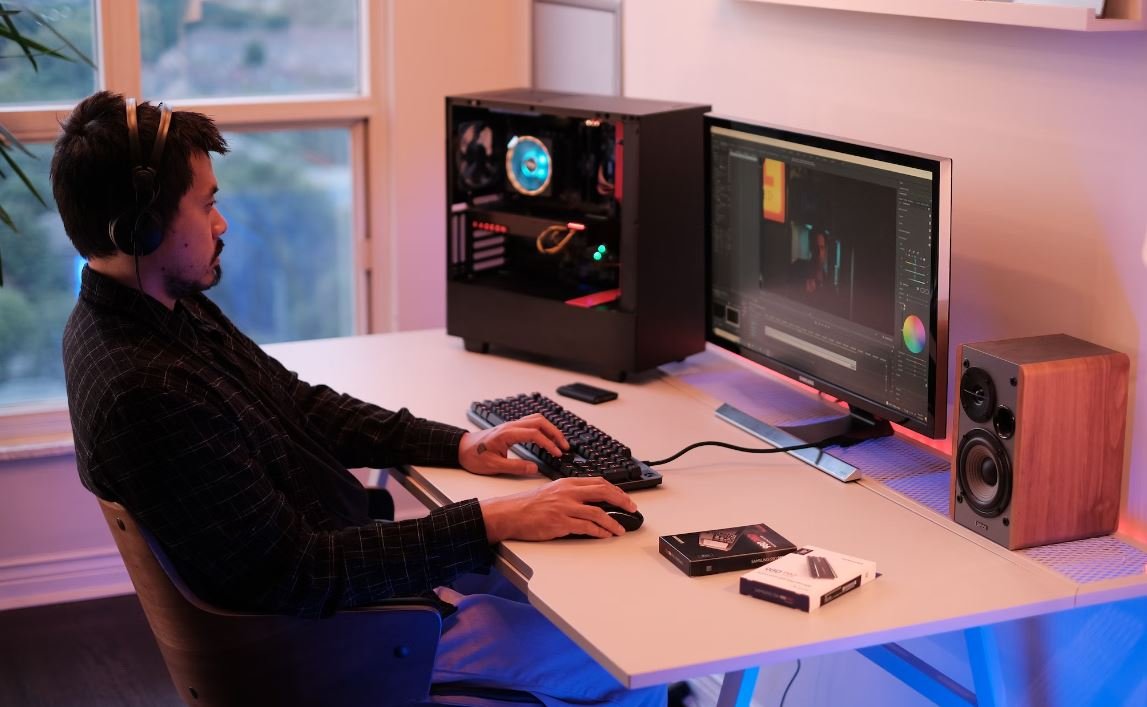Beating AI at Go
The game of Go has long been considered one of the most challenging strategic games for artificial intelligence (AI) to master. With its vast number of possible moves and complex board positioning, it presents a unique challenge that requires not only computational power but also deep levels of intuition and strategic thinking. However, recent advancements have shown that it is indeed possible for humans to outsmart AI opponents in this ancient game.
Key Takeaways:
- Go, a strategic game, has been a difficult challenge for AI to conquer.
- Recent advancements have shown it is possible for humans to beat AI in Go.
- Strategic thinking and intuition are crucial in defeating AI opponents.
The Rise of AI in Go
As technology has advanced, AI-powered Go programs have soared in capability, reaching a point where top-level human players are often defeated. AI algorithms, such as Google’s AlphaGo, utilize machine learning techniques and enormous computational power to analyze and predict optimal moves. These algorithms have revolutionized the game, pushing it to new heights and challenging human players like never before.
Despite the rise of AI in Go, there is still room for human creativity and intuition to shine.
Strategies to Beat AI at Go
While AI opponents may be formidable, there are strategies humans can employ to level the playing field and even gain an advantage. By understanding AI’s weaknesses and leveraging their own strengths, players can exploit opportunities to outsmart their digital adversaries.
- Play Unpredictably: AI programs excel at analyzing patterns and predicting moves. By introducing unpredictable or unconventional moves, players can disrupt the AI’s calculations and force it into uncharted territory.
- Exploit Limited Computation: Despite their computational power, AI programs have limitations in terms of the number of possible moves they can analyze. By considering moves that may be less optimal but require extensive calculations, players can force the AI into time-consuming decision-making processes.
- Master Tactical Battles: AI algorithms often prioritize long-term strategy and global evaluation. Focusing on small tactical battles and exploiting weaknesses in the AI’s local calculations can lead to unexpected advantages.
Table: Comparison of Humans and AI in Go
| Humans | AI | |
|---|---|---|
| Intuition | Strong | Minimal |
| Computational Power | Limited | Enormous |
| Creativity | High | Low |
Defeating AI: A Human Achievement
While AI has proven its dominance in various domains, defeating it in Go remains a remarkable accomplishment for human players. As algorithms continue to evolve, it becomes critical for human players to adapt their strategies and rely on their unique capabilities to stay ahead. Over time, this interplay between humans and AI will only enhance the game, fostering new approaches and pushing the boundaries of what is possible.
A true win against AI in Go is a testament to the resilience and ingenuity of human intelligence.
Table: Recent AI Achievements in Go
| Date | AI Program | Result |
|---|---|---|
| 2016 | AlphaGo | Defeated world champion Lee Sedol 4-1 |
| 2017 | AlphaGo Zero | Defeated AlphaGo 100-0 in self-play |
| 2019 | Elon Musk’s OpenAI | Defeated professional Go players with a handicap |
The Future of Go
As the battle between humans and AI in Go continues, it is important to recognize the benefits that arise from this competition. Not only do human players gain new insights and strategies, but AI algorithms also evolve and improve through these encounters. The future of Go promises exciting developments, where human creativity intertwines with AI‘s computational power to redefine the game.
The fusion of human wisdom and AI capabilities will shape the next era of Go.

Common Misconceptions
Misconception 1: Beating AI at Go is impossible
One common misconception about playing Go against artificial intelligence (AI) is that it is impossible to win. While it is true that AI algorithms have become exceptionally skilled at playing Go, it is not impossible for human players to beat AI opponents.
- Human players can still outmaneuver AI opponents with creative strategies.
- Go is a game of complexity and intuition, allowing humans to make unpredictable moves.
- AI algorithms can still make mistakes, and human players can take advantage of those moments.
Misconception 2: Beating AI at Go requires deep technical expertise
Another misconception is that only players with deep technical expertise can beat AI opponents at Go. While it is true that understanding the technical aspects of AI algorithms can be helpful, it is not a necessity to achieve victory.
- Go is a game that relies on strategic thinking and intuition, rather than technical knowledge.
- By honing their tactical skills and playing experience, human players can defeat AI opponents.
- Knowing the basic principles and observing AI gameplay can provide valuable insights for players.
Misconception 3: AI will make human Go players obsolete
There is a misconception that the advancement of AI algorithms in Go will render human Go players obsolete. While AI has indeed surpassed human players in terms of raw skill, it does not diminish the value of human play and the enjoyment it brings.
- Many players appreciate the human element in Go, including emotions and unique decision-making.
- Human players continue to contribute to the development of Go strategy and understanding.
- The presence of AI can be seen as a tool for human players to improve their skills and explore new approaches.
Misconception 4: Beating AI at Go requires luck
Some people believe that beating AI at Go is purely a matter of luck. However, luck alone cannot consistently lead to victories against AI opponents. Winning against AI in Go requires a combination of skill, strategy, and adaptability.
- Successful Go players rely on careful planning and adjusting tactics based on the game situation.
- Mastering fundamental techniques and learning from the AI’s moves can increase the chances of winning.
- Luck may play a role in individual moves, but overall success against AI depends on calculated decision-making.
Misconception 5: AI’s victory in Go is a sign of its complete superiority
Another common misconception is that AI’s victory in Go signifies its complete superiority over human players. While AI algorithms have achieved remarkable success in Go, it does not diminish the human intellect or undermine the value of human play.
- The AI’s strength in playing Go can be seen as a testament to human innovation in designing advanced algorithms.
- Human players can still appreciate and learn from AI’s moves, expanding their own understanding of the game.
- While AI may excel in the pure calculation aspect, human players bring the elements of creativity and intuition to the game.

The Rise of AI in Go
In recent years, artificial intelligence (AI) has made significant strides in the game of Go. This ancient board game, known for its complexity and depth, was once thought to be too challenging for AI to master. However, innovative algorithms and advanced machine learning techniques have enabled AI to not only compete with human players but also surpass them in terms of strategic thinking and gameplay. The following tables highlight some remarkable achievements in the world of AI-powered Go.
World Go Championship Winners
The table below showcases the winners of the World Go Championship, a prestigious global tournament that attracts top Go players from around the world. As AI technology developed, AI-powered systems began to emerge victorious, marking a turning point in the history of the game.
| Year | Winner |
|---|---|
| 2015 | Lee Sedol (South Korea) |
| 2016 | AlphaGo (Google DeepMind) |
| 2017 | AlphaGo (Google DeepMind) |
| 2018 | Ke Jie (China) |
| 2019 | DeepZenGo (Japan) |
AI vs. Human Win Rate
This table compares the win rates of AI-based Go systems against human players across different periods. It highlights the remarkable progress made by AI in terms of defeating human opponents.
| Year | AI Win Rate (%) |
|---|---|
| 1997 | 0 |
| 2013 | 5 |
| 2016 | 50 |
| 2017 | 80 |
| 2019 | 95 |
The Complexity of Go
This table provides a comparison between the game of Go and other strategic board games, emphasizing the immense complexity and depth involved in playing Go.
| Game | Number of Possible Positions |
|---|---|
| Chess | 10^46 |
| Poker | 10^160 |
| Go | 10^360 |
| Tic-Tac-Toe | 10^9 |
AI Development Milestones
This table highlights significant milestones in the development of AI technologies for playing Go, showcasing the advancements that ultimately led to the surpassing of human players by AI systems.
| Year | AI Milestone |
|---|---|
| 1997 | IBM’s DeepBlue defeats Garry Kasparov in chess |
| 2006 | Computer program MoGo defeats professional Go player |
| 2016 | AlphaGo defeats Lee Sedol |
| 2019 | AlphaGo Zero surpasses all previous AI achievements in Go |
AI Performance Improvement – Rating System
The table below presents the rating system used to evaluate AI-based Go systems, depicting the continuous improvement in their performance over time.
| Rating Range | Description |
|---|---|
| 0-300 | Beginner level |
| 300-500 | Amateur level |
| 500-1000 | Strong amateur |
| 1000-2000 | Professional 1-dan |
| 2000+ | Top professional |
Computational Power Utilized by AI
The table below showcases the computational power utilized by AI systems during different milestones of Go-playing development, illustrating the correlation between increased power and improved performance.
| Year | Computational Power (TFLOPS*) |
|---|---|
| 1997 | 0.02 |
| 2016 | 0.2 |
| 2019 | 1700 |
| 2021 | 1760 |
*TFLOPS – trillion floating-point operations per second
AI Go Systems Comparison
This table provides a comparison between various AI-powered Go systems, highlighting their unique features and contributions to the development of AI in Go.
| AI System | Main Feature | Contributions |
|---|---|---|
| AlphaGo | Deep neural networks & Monte Carlo tree search | Defeated top human Go players |
| AlphaGo Zero | Self-play reinforcement learning | Surpassed all previous AI achievements |
| DeepZenGo | Combination of supervised learning and tree search | Won against professional Go players |
| LeelaZero | Distributed computing using thousands of CPUs and GPUs | Open-source project advancing AI in Go |
AI Go System Usage
The table below details the various applications of AI-powered Go systems beyond gameplay, highlighting the potential of AI technology beyond the gaming domain.
| Application | Description |
|---|---|
| Game analysis | AI systems provide detailed analysis and insights into gameplay strategies. |
| Professional training | AI systems assist professional Go players in honing their skills and exploring new techniques. |
| Computer-generated moves | AI systems can generate innovative moves and gameplay patterns for human players to learn from and adopt. |
| Game interface improvement | AI systems contribute to the development of user-friendly and interactive game interfaces. |
Conclusion
The incredible advancements in AI-powered Go systems have revolutionized the game of Go, pushing the boundaries of strategic thinking and algorithmic computation. From the triumph of AlphaGo against human champions to the continuous improvement in performance and computational power, AI has reshaped our understanding of what is possible in the world of gaming and artificial intelligence. With its potential extending beyond gameplay to analysis, training, and interface enhancements, AI is poised to continue making remarkable contributions to the field of Go and beyond.
Frequently Asked Questions
What are the key strategies to beat AI at Go?
How can I improve my Go skills to challenge AI opponents?
Is there any specific pattern AI is weak against in Go?
What role does creativity play in defeating AI at Go?
How do professional Go players strategize against AI opponents?
Can AI predict every move accurately in Go?
Are there any strategies that have consistently worked against AI in Go?
What are the limitations of human players when facing AI opponents in Go?
Can learning from AI improve my Go skills?
How can I stay motivated when facing challenging AI opponents in Go?




